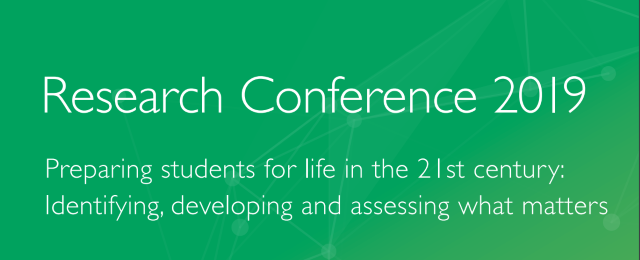
Monday 5 August 2019
Start Date
5-8-2019 11:30 AM
End Date
5-8-2019 12:30 PM
Subjects
Empathy, Generic skills, Interpersonal competence, Medical students, Medical education, Graduate attributes, Skill development, Clinical teaching (Health professions), Evaluation, Higher education
Abstract
Frameworks for the teaching and assessment of 21st-century skills commonly recognise the importance of learning and skill development in the interpersonal domain. They also usually acknowledge the challenge of reliably and validly assessing students in this domain. In the field of medical education and in selecting students for medical courses, the concept of empathy has become central to representing the particular interpersonal understandings and skills expected of students and practising doctors. Attempts to assess these attributes during medical training are just as challenging as in school contexts. This presentation draws on several years’ experience of working with medical educators to consider how empathy has been conceptualised, taught and assessed by educators. This analysis explores three common assessment approaches: self-report, performance examinations, and longitudinal observation and judgement in the clinical context. Each approach addresses important aspects of empathy and interpersonal skills. Each also has its limitations, although the self-report approach has emerged as the more widely known and used in medical education. Much still remains to be understood about making meaningful and valid use of observational judgements in the assessment of empathy, and, by extension, the interpersonal domain. In the meantime, useful guidance for teachers assessing interpersonal skills in the classroom may be found in alternative learning frameworks currently used in professional education that precede the 21st-century skills movement.
Recommended Citation
Chiavaroli, N. (2019, August 05). Assessment in the interpersonal domain: Experiences from empathy assessment in medical education [Paper presentation]. Research Conference 2019 - Preparing students for life in the 21st century: Identifying, developing and assessing what matters. https://research.acer.edu.au/research_conference/RC2019/5august/6
Recommended Citation (OVERRIDE)
Chiavaroli, N. (August 2019). Assessment in the interpersonal domain: Experiences from empathy assessment in medical education. In K. Cockle (Ed.), Research Conference 2019: Preparing students for life in the 21st century: Identifying, developing and assessing what matters: Proceedings and Program: 4–5 August 2019, Melbourne Convention and Exhibition Centre. (pp.62-67). https://research.acer.edu.au/cgi/viewcontent.cgi?article=1356&context=research_conference
Copyright Statement
Copyright Australian Council for Educational Research 2019
Place of Publication
Melbourne, Australia
Publisher
Australian Council for Educational Research (ACER)
ISBN
9781742865546
Included in
Educational Assessment, Evaluation, and Research Commons, Medical Education Commons, Personality and Social Contexts Commons
Assessment in the interpersonal domain: Experiences from empathy assessment in medical education
Frameworks for the teaching and assessment of 21st-century skills commonly recognise the importance of learning and skill development in the interpersonal domain. They also usually acknowledge the challenge of reliably and validly assessing students in this domain. In the field of medical education and in selecting students for medical courses, the concept of empathy has become central to representing the particular interpersonal understandings and skills expected of students and practising doctors. Attempts to assess these attributes during medical training are just as challenging as in school contexts. This presentation draws on several years’ experience of working with medical educators to consider how empathy has been conceptualised, taught and assessed by educators. This analysis explores three common assessment approaches: self-report, performance examinations, and longitudinal observation and judgement in the clinical context. Each approach addresses important aspects of empathy and interpersonal skills. Each also has its limitations, although the self-report approach has emerged as the more widely known and used in medical education. Much still remains to be understood about making meaningful and valid use of observational judgements in the assessment of empathy, and, by extension, the interpersonal domain. In the meantime, useful guidance for teachers assessing interpersonal skills in the classroom may be found in alternative learning frameworks currently used in professional education that precede the 21st-century skills movement.

